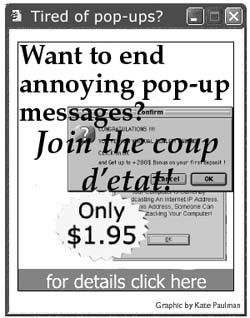Internet advertising boycotts, woes and what to do

January 22, 2004
Define Irony:
leaving your computer to use the facility and having thirty-fourto sixty-seven pop-ups waiting for you upon return. The irony? Morethan half of the pop-ups read, “Want to end pop-up messages?
(See Also: Mass emails with a paragraph from the authorapologizing for sending a mass email.)
If you haven’t had “the pleasure” of coming across a pop-up,then I’ll explain their identity. Pop-ups are the advertisementboxes that appear on your screen while surfing the Internet.Pop-ups bug Internet surfers and drive otherwise sane peopleblood-seeking mad because they interfere with surfers’ normalsurfing.
A good example is a certain, yellow-background “pop-up” thathunts the Simpson network and causes both of my compact disc drivesto open every time I log in to Explorer. After I am fuming, and ina dazed, disoriented state, the same annoying sales pitch is shotbefore my revenge-seeking eyes:
“If you want an end to annoying pop-up messages like this, buyour software.”
Messages like these are known as Messenger Spams, and accordingto a story in Wired News, “they are sent using special softwarethat taps into a Windows feature designed to enable administratorsto send messages to users on a network.
In other words, it is a lot easier for these companies to usethis ridiculous method than to have to assemble mailing lists.
To me, these practices are blackmail. It’s like buying abulletproof vest from the guy who says he’s going to shoot youtomorrow.
We, as Simpson students, men and women pursuing educations andjust good, old-fashioned Americans, should not stand for suchinfamy. My friends and not-so-loyal readers do not break down. Donot buy anti-pop-up services from a pop-up company. Doing so onlyencourages, in my mind, a horribly unethical practice.
Due to the immensity of the pop-up problem, Internet companiesare desperately trying to fight this defaming part of the web.According to news.com, an online technology information Website,pop-ups are such a nuisance that America Online has recently givenup purchasing adds from third-party advertisers (groups possiblyassociable with pop-ups). This move will cost AOL $30 million nextyear. They hope reduced pop-ups will encourage growth amongst itsdeclining user base.
AOL isn’t alone, either. Netscape, Mozilla and Earthlink havedeveloped new anti-pop-up services for its users. Plus,askjeeves.com has banned its advertisers from using pop-ups ontheir site.
But are these companies’ actions just shooting a pellet at theadvertisement freight train? Advertisers believe using pop-ups isan effective way of marketing and advertisers are selling well byusing them; one was quoted on saying it makes their advertising 10to 40 times more effective. But is it legal?
An on-going court hearing is discussing pop-ups. GatorCorporation, a free-software distributor, is being sued by a groupof news organizations that says the space taken by the pop-ups isinfringing upon copyright laws. As with many Internet issues,nobody is really sure what is legal or not, and the matter is stillbeing meticulously debated over in court.
What does this mean for you, the everyday hero of Internettravel and blue-collar study? Sadly, it translates to you beingbugged by pop-ups for a seemingly good amount of time. And withthat in mind, I’d like to call everyone out to place a boycott onany product that advertises by use of pop-up advertising. Together,we can mastermind a blood(less) coup d’etat that will forevertopple the evil empire of pop-up advertisers. Every time an ad”pops-up,” feel strength in clicking on its upper-right hand “x”box.
If you truly need to permanently eradicate pop-ups from yourscreen, then I advise you to buy legitimate software from companiesthat don’t use blackmail to sell. There are several anti-virus-likesoftware products that cover the need for anti-pop-up software.
I truly believe with this evil being of advertising’snon-existance, the world will be a better place.











